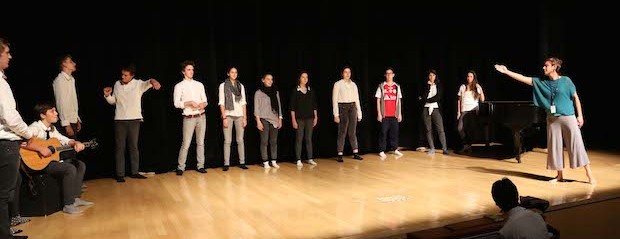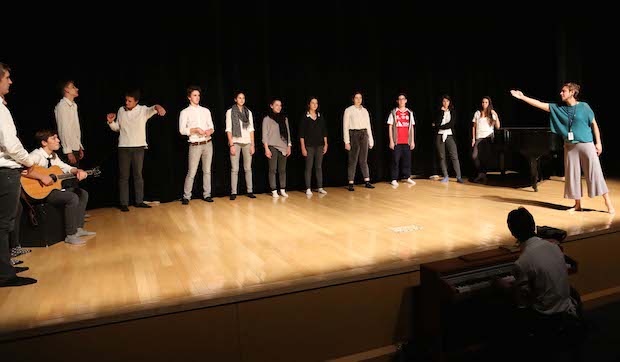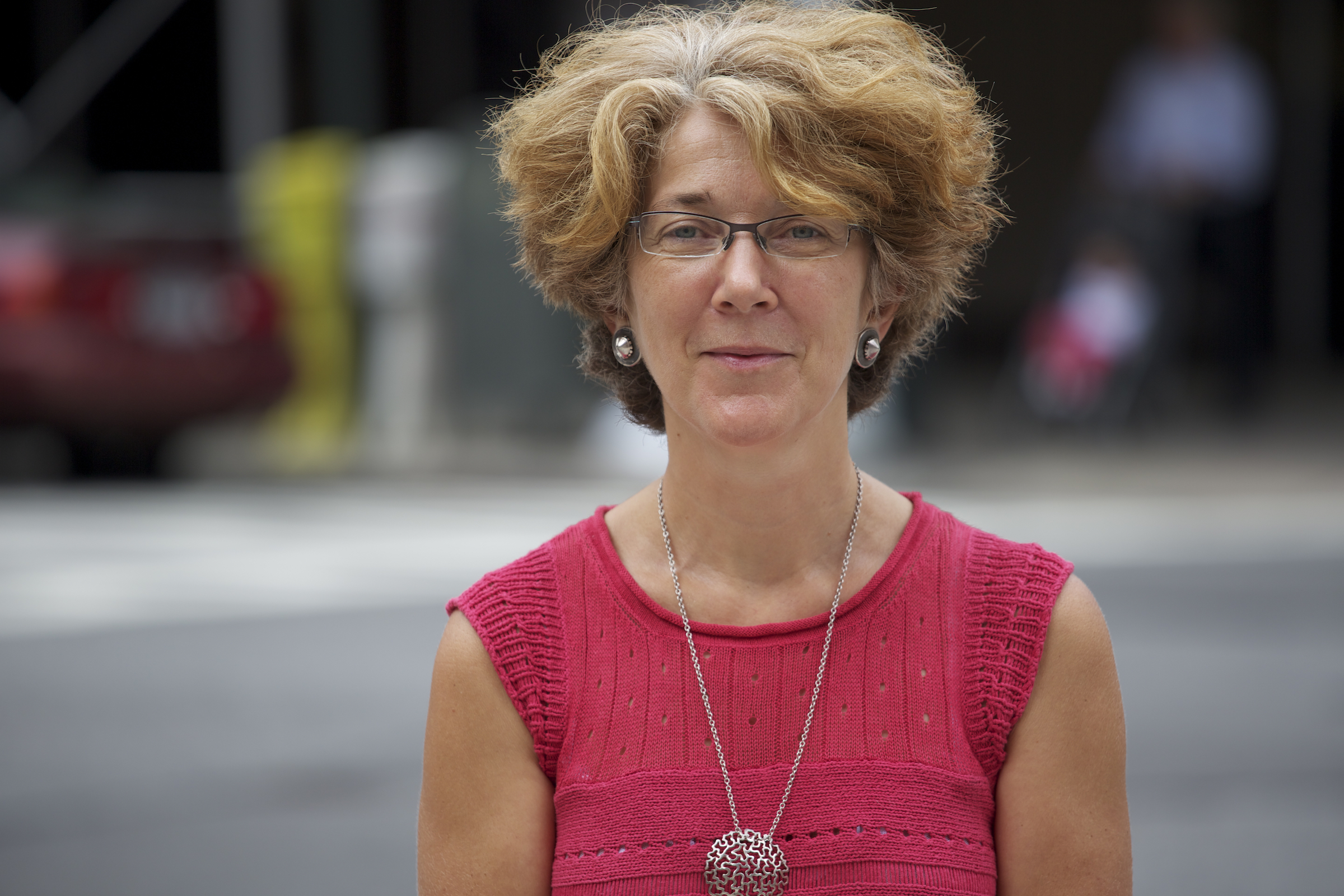Leese Walker with LFNY students on Thursday, October 9 2014.
Option Théâtre thrives when we give students the opportunity to meet performers and professionals. It introduces them to new ways of working, and because there are no grades associated with these projects, students seem to experience a kind of freedom they may not give themselves when working with teachers in regular coursework.
With this in mind, over two weeks in October, Leese Walker, a New York-based multi-directional artist, gave two master classes in “soundpainting” to eleventh- and twelfth-grade theater and music students. Miss Walker directs, teaches and performs theater. She is one of the pioneers in soundpainting, a theater art that consists of a conductor giving specific signs to actors, musicians and dancers on stage. The performers improvise as a group using their art to create a type of oral picture and impression on stage.
LFNY: How did you get involved with Soundpainting?
Leese Walker: Walter Thompson, who invented this live-composing sign language, began developing soundpainting in the late 1970’s and early 80’s with his big band of downtown improvisers (see video below). I met Walter in 1992, when I worked as an intern at the Irondale Ensemble. He was musical director, and when he got the idea to extend soundpainting into other performing arts disciplines, he called me and one other actor to help figure out how we could adapt the signs for the theater. Soon after, he began to adapt and create soundpainting language for dance. I was instrumental in the early development of soundpainting for theater and have performed as a member of The Walter Thompson Orchestra since 1998.
Today, soundpainting is practiced in 33 countries, and annual conferences draw attendees from around the world. But the country where soundpainting enjoys the greatest popularity is certainly France. France has the greatest number of soundpainting groups per capita, and I look forward to the day when an academic can put their finger on why…
LFNY: Why do a soundpainting, and what are its strengths as a means of expression?
LW: Soundpainting is a tool. Different composers use it differently. One can construct an abstract expressionist piece or a very literal narrative. What I love about soundpainting is how it allows you to sculpt a composition with a large group in real time. I have eeésoundpainted set texts such as Macbeth — we did a bilingual French-English soundpainted Macbeth where the witches soundpainted sections of the show (see video below), and I have done soundpaintings on a theme or open soundpaintings where we have no idea what the content will be.
I think one of the real gifts of soundpainting is the way it can erase the border between spectator and performer. People love interactive art, and I have seen many theaters become one large orchestra when the audience is swept into the soundpainting. They learn a few gestures and can respond to the soundpainter and to the performers on stage.
LFNY: What struck you most about working with our students on the project?
LW: I was struck by their intelligence as well as their willingness to dive into something completely different from the norm. Soundpainting requires the performers to take great leaps of faith. They have to trust the soundpainter, and they have to trust that whatever choice they make in the moment is the right choice. The students all had a little reticence at first, which is normal, but when they decided to jump in, the choices that they made on stage ranged from surprising to poignant to hilarious. I was struck by how swiftly they allowed themselves to open up and let their impulses lead. This is the task of the improviser and in only two short workshops, they were able to really soar!
Soundpainted Macbeth, performed in French and English in Paris and in New York.
About Leese Walker
Leese Walker founded her theater company, The Strike Anywhere Performance Ensemble, in 1997. She has performed many shows in New York, as well as in Paris and even Tours in France. Miss Walker also gives master classes at the Brooklyn Academy of Music (BAM) and the Roundabout Theatre Company to help students understand better the plays they are going to see. That’s how we met her. She came many times to prepare our students for a Shakespeare or a Beckett play they were going to see.
About the Author :
Isabelle Milkoff-Radigan holds an agrégation and a Ph.D in French Literature. She has taught both in Paris and nearby cities, at the junior high school, high school and university levels. At the Parisian lycée where Isabelle taught for twelve years, she created and taught theater workshops. She also led theater and literature workshops for the Académie de Paris’ teacher training programs. Isabelle likes her classes to be open to the world and enriched by an active engagement in literature. In September 2010, she joined the Lycée Français de New York as the head of the French and Philosophy Department.



